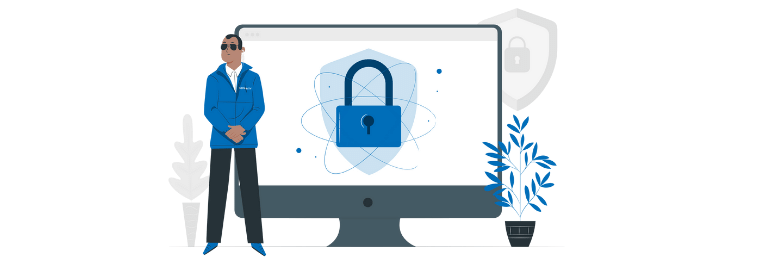Who Should Manage Your Domain Name?
December 13th, 2021 | 4 min. read

Have you ever experienced issues while managing your domain name, like failing to renew or messing up the account settings? Those might sound like minor gaffes that could easily be resolved, but they can have serious consequences for your business.
Your domain name is one of the most important aspects of your online presence; mismanaging it could result in very real problems. Those can range from failed services or infrastructure, lost revenue or business partners, a hit on your reputation, hefty regulatory fines, or even total collapse of your organization.
So, who should handle your domain to help prevent those issues from happening to you, your marketing team, or your MSP?
At ITS, we've helped hundreds of businesses manage and secure their technology, including their online assets. From our experience, having a dedicated team of experts manage your domain name can significantly reduce the chances that your business will suffer irreversible damage from DNS issues.
In this article, we'll dive into the following topics:
- What is a Domain Name?
- Common Risks in Domain Name Mismanagement
- Benefits of Letting Your MSP Manage Your Domain Name
What is a Domain Name?
Your domain name is the name that your customers type into the browser's URL bar to find your website. It's one of the most important aspects of your online presence. It basically translates your website's IP address into an easy-to-remember name, phrase, or word to make it easier for people to find you via the domain name system.
The domain name system (DNS) is a large network of servers located across the globe that contain a distributed database of domain names and IP addresses. It's responsible for matching the right domain name with its corresponding IP address.
"A domain is proof of ownership of a name," said Peter Swarowski, Director of Operations at Intelligent Technical Solutions. "If you want to start a business and you want to call it ABC Corp. You'd want to go and register a domain name like abccorp.com. You pay certain organizations out there that have been set up on the internet so you can say, 'hey, I own this,'" he explained.
Common Risks in Domain Name Mismanagement
Since domain names hold a lot of importance for your organization's online presence, it's also one of its biggest risk factors. Take a look at some of the risks you might encounter when you mismanage your domain name:
Shared Accounts and Access
 Once you've registered a domain name from a registrar, you can then choose who has access to the registrar account and manage your DNS settings. According to Swarowski, however, sharing that access to a large group can lead to some difficult situations.
Once you've registered a domain name from a registrar, you can then choose who has access to the registrar account and manage your DNS settings. According to Swarowski, however, sharing that access to a large group can lead to some difficult situations.
"Sometimes we run into some tricky scenarios where the guy running the website doesn't know about all these other pieces of technology that rely on this being done correctly," he detailed. "They focus only on whether the website loads on the internet and then move name servers without checking records and recreating them. As a result, they leave the mail exchanger record as default to edit, so the client's email stops working," he stated.
Giving access to your domain settings to a number of people unnecessarily can increase your risk for costly mistakes that can bring down your website for hours.
Inexperienced Domain Name Resource
 There are some instances where responsibility for managing your domain name falls onto inept or busy hands. Perhaps the person in charge doesn't know how to manage it properly, or they are simply stretched too thin to bother with the details. In those cases, you could run a higher risk of failing to renew your domain.
There are some instances where responsibility for managing your domain name falls onto inept or busy hands. Perhaps the person in charge doesn't know how to manage it properly, or they are simply stretched too thin to bother with the details. In those cases, you could run a higher risk of failing to renew your domain.
If you fail to renew your domain, you could end up losing it or have to pay extra to get it back. "Depending on what the time frame is, [your domain name] can get released and go back up for bid for someone else to buy and take ownership over it," Swarowski stated. "Then sometimes you have people who will snatch stuff up and then try to re-sell it to you for a profit. It can definitely present some risk if you don't catch it quick enough," he added.
Poor DNS Security
 Leaving the day-to-day management of your DNS to someone who doesn't understand it can leave you open to attacks. DNS leaks and DNS hijacking are very real threats that could cost you dearly. A malicious actor can redirect traffic going to your website to somewhere else where they can steal customer information, install malware, and more.
Leaving the day-to-day management of your DNS to someone who doesn't understand it can leave you open to attacks. DNS leaks and DNS hijacking are very real threats that could cost you dearly. A malicious actor can redirect traffic going to your website to somewhere else where they can steal customer information, install malware, and more.
It's a favorite target for many cyber criminals because many businesses do not take the basic precautions necessary to protect their domain name. Making sure that you have extra layers of security in place could help prevent that.
Uncertainty with Domain Ownership
 Who owns your domain name? Is it the company or the person who filed the registration? If your company's name is not listed as the domain name's owner, that could present some major issues down the line.
Who owns your domain name? Is it the company or the person who filed the registration? If your company's name is not listed as the domain name's owner, that could present some major issues down the line.
People in your team change, and when they do, you might find that your business does not have proof of ownership for your company name online because it belongs to someone else.
Benefits of Letting Your MSP Manage Your Domain Name
If you don't have qualified people to take care of managing your DNS, you could choose to hand it over to professionals like your managed services provider (MSP). They have the expertise to manage and handle your needs. Here are some of the benefits you can take advantage of:
Extra Layer of Security
 Some MSPs offer a cybersecurity package that offers extra layers of security, including monitoring for DNS leaks and DNS filtering.
Some MSPs offer a cybersecurity package that offers extra layers of security, including monitoring for DNS leaks and DNS filtering.
"[Some MSPs] do have some product offerings on the endpoint that provide DNS filtering, so it's like another layer of security if something were to get past the firewall," Swarowski said. DNS filtering helps by stopping the attack chain of malicious actors. According to him, if you try to reach a bad domain that can attack your machine with malware, the DNS filter will prevent you from completing the connection.
Prevent and Troubleshoot DNS Errors

Letting the experts take over also has the added benefit of allowing you to prevent or troubleshoot issues promptly.
According to Swarowski, a DNS issue could take time to resolve. That's because even if the issue is fixed immediately, the change won't be reflected until the change trickles out across the internet. That means your website could go down for hours, especially if the person managing your settings isn't well-versed. Having an expert resolve the issue can help improve that time significantly.
Centralized Domain Management
 Centralizing your domain management is a good practice to prevent errors, miscommunication, and mismanagement. Having an MSP filter through changes will also prevent any issues when it comes to domain migration and web development.
Centralizing your domain management is a good practice to prevent errors, miscommunication, and mismanagement. Having an MSP filter through changes will also prevent any issues when it comes to domain migration and web development.
In addition, if the person handling your domain suddenly leaves or changes contact numbers, it might cause issues down the line. However, if your MSP handles it, you can rest assured that you can contact them for anything immediately.
Need Expert Help to Manage Your Domain?
Managing your domain is an important task that you shouldn't take lightly. Try to reduce the risks of domain mismanagement by centralizing it and assigning a qualified team member to handle it. If not, you can leave it to the experts.
At ITS, we've helped hundreds of clients manage their domains and online assets. Find out how we can help you. Schedule a meeting with one of our experts.
Mark Sheldon Villanueva has over a decade of experience creating engaging content for companies based in Asia, Australia and North America. He has produced all manner of creative content for small local businesses and large multinational corporations that span a wide variety of industries. Mark also used to work as a content team leader for an award-winning digital marketing agency based in Singapore.
Topics:
